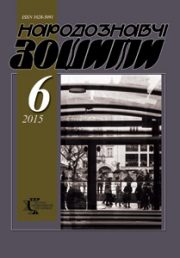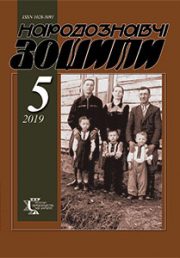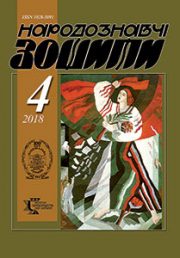The Ethnology Notebooks. 2024. № 2 (176), 297—315
UDK 930.2:271.4-726.25(477.85-25)”18″І.Величко
DOI https://doi.org/10.15407/nz2024.02.297
PRIEST YAKIV VELYCHKO (1801—1867) AND HIS CONTRIBUTIONS TO THE ALICHINA NATIONAL REVITAL
NESTERUK Yuriy
- ORCID ID https://orcid.org/0000-0003-2043-0852
- Doctor of Biology,
- Lviv, Ukraine,
- Contacts: e-mail: yuri.nesteruk@gmail.com
NESTERUK Nazarii
- ORCID ID https://orcid.org/0000-0002-5402-9058
- Master of Philosophy, Master of History and Archaeology,
- Lviv, Ukraine,
- Contacts: e-mail: nazariynesteruk@gmail.com
Abstract. For the first time in national historiography, the publication provides information about Pr. Yakiv Velichko (1801—1867), the main milestones of the
biography, family, pastoral, public and publishing activities of priest of the village of Ugryniv with a branch in Nismychy in the Sokal region, a member of the
Council of Russ Scientists in 1848, brief description of his publications in the magazine «Zorya Halytska», the initiator and author of the «Peremyshlian» and
«Lvivianyn» lunar calendars, comments on them by Ivan Franko, contribution to educational activities and national revival of Galicia.
The subject of the research is the figure of Pr. Yakiv Velichko, his church and social activities.
The purpose of the study is to highlight the life path, pastoral and social activities of Pr. Yakiv Velichko.
The relevance of the article lies in the need to investigate the life path, pastoral achievements, public work and publishing activity of Pr. Yakov Velichko.
The source base for this study was the funds of the Central State Historical Archive of Ukraine in Lviv (then — CSHAU in Lviv), the Lviv National Scientific
Library of Ukraine named by Vasyl Stefanyk (them — ЛННБУ) (departments of manuscripts, periodicals named after Maryan and Ivanna Kotsiv, Ukrainian and
rare books), the Scientific Library named by Ivan Franko Lviv National University (then — НБ ЛНУ) (main book fund, department of manuscripts, old printed
and rare books named after F.P. Maksimenko), as well as the State Archive in Przemyśl, Poland (then — APP), Fund 142: Archive of the Ukrainian Greek-
Catholic Eparchy in Peremyshl.
Keywords: Pr. Yakiv Velichko, Ugryniv, Nismychi, Greek Catholic Church, Cathedral of Russ Scholars, lunar calendars «Peremyshlian» and «Lvivianyn».
Received 23.02.2024
REFERENCES
- Nesteruk, Y., & Nesteruk, N. (2020). Priest Ivan Velychko (1836—1889): life path, religious and social activities. Ethnology notebooks, 2 (152), 435—449 [in Ukrainian].
- State Archives in Przemysl. Copies of record books of the Uhrynow parish with the Nusmyce branch (Warez deanery) from the years 1784—1841, 1843—1844. Fund 56. Desc. 142. Case 7957 [in Latin].
- Niesielski, K. (1842). Herbarz Polski (Vol. 9). Leipzig: published and printed by Breitropf and Haertel [in Polish].
- Ioann Syrokomlia, Velichko (obituary). (1889). Dushpastyr, 15 (27), 332—333 [in Ukrainian].
- State Archives in Przemysl. Copies of record books of the Uhrynow parish with the Nusmyce branch (Warezh deanery) from the years 1791—1830, 1836—1837, 1839, 1841—1842, 1844). Fund 156. Desc. 142. Case 7591 [in Latin].
- Central State Historical Archive of Ukraine in Lviv. Fund 451. Desc. 2. Case 598 [in Latin].
- Central State Historical Archive of Ukraine in Lviv. Fund 451. Desc. 2. Case 388 [in Latin].
- Slobodian, V. (1998). Churches of Ukraine: Peremyska eparchy. Lviv [in Ukrainian].
- (1828). Schematismus universi venerabilis cleri Dioeceseos Graeco Catholicae Premisliensis pro anno domini 1828. Typis Golebiowskianis. Premisliae [in Latin].
- (1830). Schematismus universi venerabilis cleri Dioeceseos Graeco Catholicae Premisliensis pro anno domini 1830. Typis Golebiowskianis. Premisliae [in Latin].
- (1831). Schematismus universi venerabilis cleri Dioeceseos Graeco Catholicae Premisliensis pro anno domini 1831. Typis Golebiowskianis. Premisliae [in Latin].
- (1835). Schematismus universi venerabilis cleri Dioeceseos Graeco Catholicae Premisliensis pro anno domini 1835. Typis Golebiowskianis. Premisliae [in Latin].
- Blazhejovskyy, D. (1995). Historical schematism of the Przemysl eparchy with the inclusion of the Apostolic Administration of Lemkivshchyna (1828—1939). Lviv: Kamenyar [in Ukrainian].
- Ripetskyi, M. (1968). Memories of the village of Ughryniv. Extractume «Bohoslovia», 32 [in Ukrainian].
- (1848, september 5). He will invite Russian scholars to a convention in Lviv. Zorya Halytska, 17, 1 [in Ukrainian].
- Golovatskyi, Ya. (1850). Historical outline of the foundation of the Galician-Russian mother and report of the first council of Russian scholars and lovers of national enlightenment. Lviv: cuttings of the Stavropigiyansky Institute [in Ukrainian].
- (1891). Galician «Obscher-Russke linguistic unity». Dilo, 167, 1—2 [in Ukrainian].
- Levytskyi, K. (1926). History of political thought of Galician Ukrainians 1848—1914: based on memories. Own printing, from the printing house o.o. Vasiliyan in Zhovkva. Lviv [in Ukrainian].
- Vozniak, M. (1908). Ivan Zhukivsky’s orthography project at the congress of «Russian scientists». Notes of the Shevchenko Scientific Society, 82, 53—86 [in Ukrainian].
- [Velychko, Ya.]. (1850). A word to improve the education of rural children. Zorya Halytska, 3, 6—8; 2, 16—18; 5, 30—32; 7, 39—42; 9, 53—55; 10, 59—60 [in Ukrainian].
- Velichko, Ya. (1850). National Celebration in Ugrynov, Zholkovskogo district on May 3, 1950. Zorya Halytska, 51, 306—307 [in Ukrainian].
- Velichko, Ya. (1851). Ugrynov from Zholkovskyy district. Zorya Halytska, 5, 40—41 [in Ukrainian].
- Sedlyar, O., Golovata, L., & Pasichnik, V. (Ed.). (2021). Galician calendars of the middle of the 19th century in the evaluation of the Ukrainian press. Publishing movement in Ukraine: environment, artifacts: supplement and reported II International of science conf. (Lviv, October 29, 2021) (Pp. 68—71). National Academy of Sciences of Ukraine; LNNB of Ukraine named V. Stefanyk. Lviv [in Ukrainian].
- (1849, june 25). Acts of the Galician-Russian Motherland. From July 26, 1848, to March 23, 1849. Pchola, 8, 123—124 [in Ukrainian].
- (1849, 29 july). Acts of the Galician-Russian Motherland. June 20, 1849. Pchola, 13, 203—205 [in Ukrainian].
- (1849, august 5). Protocol. Meetings of Matitsa on June 27, 1849. Pchola, 14, 219—220 [in Ukrainian].
- Barchuk, M. (2012—2013). The role of Przemysl in the formation of the Ukrainian literary language of Galicia in the middle of the 19th century. Ukrainian studies studios (Vol. 13—14, pp. 56—59). Ivano-Frankivsk [in Ukrainian].
- Siciak, A. (2015). The beginnings and development of typographic, bookselling and publishing traditions in Przemysl (1754—1866). Rocznik Przemyski, 51 (3), 3—28 [in Polish].
- Krochmal, A. (2016). Historical archive of the Przemysl eparchy. State Archives in Przemysl. Przemysl [in Polish].
- Steblii, F., & Zabrovarny, S. (Ed.). (1996). Przemysl cultural and educational center and its figures of the era of Ukrainian national revival. Przemysl and Przemysl land throughout the ages. Collection of scientific papers and materials of the International Scientific Conference organized by the T. Shevchenko Scientific Society in Poland, June 24—25, 1994 in Przemysl (Pp. 103—130). Przemysl; Lviv [in Ukrainian].
- (1850). Peremyshlyanin of folk attraction for the year 1850. Peremyshl: Cathedral Krylos; Russian cuttings [in Ukrainian].
- (1850). Calendar for a regular year from Christmas of the Lord and Savior Jesus Christ 1850. Lviv: publishing of Institute of Stavropigianskyy [in Ukrainian].
- Velichko, Yakiv. (Ed.). (1857). Przemyshlyanin. The Monthly for the year 1857. Peremyshl: published by M. Dzikovsky [in Ukrainian].
- Velichko, Yakiv. (Ed.). (1858). Przemyshlyanin. Monthly for the year 1858. Peremyshl: in the edition of the establishment of widows and priests [in Ukrainian].
- Velichko, Yakiv. (Ed.). (1859). Przemyshlyanin. Monthly words for the year 1859. Peremyshl: publishing house of the institution of widows and orphans of priests [in Ukrainian].
- Velichko, Yakiv. (Ed.). (1860). Przemyshlyanin. Lunar calendar for the 366-day year of 1860. Calculated on the Lviv sky, containing: Chronological lunar calendar of the Eastern Russian and Roman rite, calculates the astronomical sun and moon, the calendar of the Jewish separate liturgy for this year. Peremyshl: in charge of the establishment of widows and orphans of priests [in Ukrainian].
- Velichko, Yakiv. (Ed.). (1860). Przemyshlyanin. Months for the year 1861. Peremyshl: published by the establishment of widows and priests [in Ukrainian].
- Franko, I. (1885). Russian Theater in Galicia. Zorya, 24, 279—283 [in Ukrainian].
- Franko, I. (1893). From the field of our science. Narod, 19; 20, 224—228; 21, 251—255 [in Ukrainian].
- Franko, I. (1904). [Ref.:] M. Komarov. «T. Shevchenko in literature and art». Bibliographic index of materials for studying the life and works of T. Shevchenko. Notes of the Shevchenko Scientific Society, 13, 31—42 [in Ukrainian].
- Franko, I. (1910). Studies on Ukrainian folk songs. XXXI. Songs about a mosquito. Notes of the Shevchenko Scientific Society, 19, 30—53 [in Ukrainian].
- Franko, I. (1913). The alphabet war in Galicia in 1859. Records of the Shevchenko Scientific Society, 115, 131—153 [in Ukrainian].
- (1861). Lvivianyn, handy and business calendar for a regular year 1861. Lviv: published by M.N. Kossak, from the printing house of the Stavropygian Institute [in Ukrainian].
- (1862). Lvovianyn, handy and business calendar for a regular year 1862. Lviv: published by M.N. Kossak, from the printing house of the Stavropygian Institut, [in Ukrainian].
- Lvivianyn, handy and business calendar for a regular year 1863. Lviv: published by M.N. Kossak, in the printing house of the Stavropygian Institute [in Ukrainian].
- Franko, I. (1886). To the bibliography of works St. Rudansky. Zorya, 7, 120 [in Ukrainian].
- Franko, I. (1910). Essay on the history of Ukrainian-Russian literature. Lviv: Published by the Ukrainian-Russian Publishing Union [in Ukrainian].
- Yakiv Velichko [obituary]. (1867). Slovo, 7 (93), 4 [in Ukrainian].






